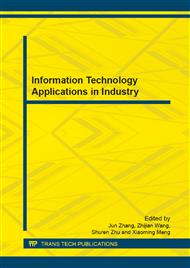p.1105
p.1111
p.1116
p.1121
p.1127
p.1134
p.1138
p.1142
p.1150
A QoS-Aware Power-Control Game Scheme for Secondary Users in Cognitive Radio Network
Abstract:
To deal with the power control problem in cognitive radio (CR) networks, in this paper, the non-cooperative power game is studied, in which each CR user distributedly and asynchronously updates its transmission power. Taking into account the different quality of service (QoS) requirements, with the objective as maximizing the average utility of each CR user under the interference power constraints of primary users, we propose a QoS-aware power control game scheme and introduce the sigmoid efficiency function related with CR user’s signal-to-noise ratio threshold and the price function. Besides, extensive simulation results are presented to show the significant performance improvement of the proposed scheme compared to the existing ones.
Info:
Periodical:
Pages:
1127-1133
Citation:
Online since:
December 2012
Authors:
Keywords:
Price:
Сopyright:
© 2013 Trans Tech Publications Ltd. All Rights Reserved
Share:
Citation:


